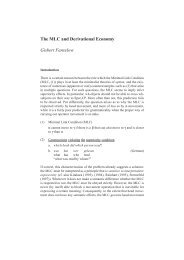Explaining language change: A three step process
Explaining language change: A three step process
Explaining language change: A three step process
Create successful ePaper yourself
Turn your PDF publications into a flip-book with our unique Google optimized e-Paper software.
<strong>change</strong>s by saying that children sometimes do mistakes and that<br />
they misinterpret information. This can also be seen from the<br />
fact that grammar <strong>change</strong>s not only take to complex or rare<br />
phenomena, but also those we can assume are rather simple.<br />
Hence we should claim that children must have good reasons<br />
for misinterpreting the information they receive, rather than<br />
saying that they have made mistakes (cf. Guðmundsdóttir<br />
2000). There are two main factors to take into consideration<br />
when studying <strong>language</strong> acquisition in this connection:<br />
(7) a. Does the <strong>language</strong> competence of the parents<br />
offer another interpretation of the system?<br />
b. Does <strong>language</strong> performance fully reflect <strong>language</strong><br />
competence?<br />
These questions help us to search for natural explanations for<br />
the misinterpretation that can take place during <strong>language</strong><br />
acquisition. Neither inaccuracy, laziness, nor lack of logical<br />
thinking is the reason for the so-called mistakes that the<br />
children do, leading to grammar <strong>change</strong>s, rather the mistakes<br />
reflect a very logical interpretation of the information the<br />
children receive through <strong>language</strong> use.<br />
As discussed earlier, children do only have access to the<br />
grammar (I-<strong>language</strong>) of their parents through their <strong>language</strong><br />
performance. Therefore it is natural to expect grammar <strong>change</strong>s<br />
to take place where there is no obvious connection between<br />
interpretation of the <strong>language</strong> performance (output) and the<br />
underlying structure. Grammatical phenomena cannot be<br />
acquired correctly unless they are clearly reflected by <strong>language</strong><br />
performance. When a certain phenomenon has survived through<br />
many generations, it must have been reflected clearly in the<br />
18

















